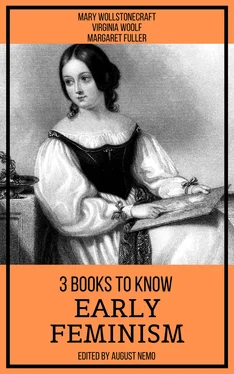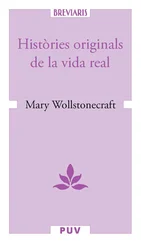If such be the force of habit; if such be the bondage of folly, how carefully ought we to guard the mind from storing up vicious associations; and equally careful should we be to cultivate the understanding, to save the poor wight from the weak dependent state of even harmless ignorance. For it is the right use of reason alone which makes us independent of every thing — excepting the unclouded Reason —‘Whose service is perfect freedom.’
MODESTY.- COMPREHENSIVELY Considered, and Not as a Sexual Virtue.
––––––––
MODESTY! SACRED OFFSPRING of sensibility and reason! — true delicacy of mind! — may I unblamed presume to investigate thy nature, and trace to its covert the mild charm, that mellowing each harsh feature of a character, renders what would otherwise only inspire cold admiration — lovely! — Thou that smoothest the wrinkles of wisdom, and softenest the tone of the sublimest virtues till they all melt into humanity; — thou that spreadest the ethereal cloud that, surrounding love, heightens every beauty, it half shades, breathing those coy sweets that steal into the heart, and charm the senses — modulate for me the language of persuasive reason, till I rouse my sex from the flowery bed, on which they supinely sleep life away!
In speaking of the association of our ideas, I have noticed two distinct modes; and in defining modesty, it appears to me equally proper to discriminate that purity of mind, which is the effect of chastity, from a simplicity of character that leads us to form a just opinion of ourselves, equally distant from vanity or presumption, though by no means incompatible with a lofty consciousness of our own dignity. Modesty, in the latter signification of the term, is, that soberness of mind which teaches a man not to think more highly of himself than he ought to think, and should be distinguished from humility, because humility is a kind of self-abasement.
A modest man often conceives a great plan, and tenaciously adheres to it, conscious of his own strength, till success gives it a sanction that determines its character. Milton was not arrogant when he suffered a suggestion of judgment to escape him that proved a prophesy; nor was General Washington when he accepted of the command of the American forces. The latter has always been characterized as a modest man; but had he been merely humble, he would probably have shrunk back irresolute, afraid of trusting to himself the direction of an enterprise, on which so much depended.
A modest man is steady, an humble man timid, and a vain one presumptuous:— this is the judgment, which the observation of many characters, has led me to form. Jesus Christ was modest, Moses was humble, and Peter vain.
Thus, discriminating modesty from humility in one case, I do not mean to confound it with bashfulness in the other. Bashfulness, in fact, is so distinct from modesty, that the most bashful lass, or raw country lout, often become the most impudent; for their bashfulness being merely the instinctive timidity of ignorance, custom soon changes it into assurance. [50]
The shameless behaviour of the prostitutes, who infest the streets of this metropolis, raising alternate emotions of pity and disgust, may serve to illustrate this remark. They trample on virgin bashfulness with a sort of bravado, and glorying in their shame, become more audaciously lewd than men, however depraved, to whom this sexual quality has not been gratuitously granted, ever appear to be. But these poor ignorant wretches never had any modesty to lose, when they consigned themselves to infamy; for modesty is a virtue, not a quality. No, they were only bashful, shame-faced innocents; and losing their innocence, their shame-facedness was rudely brushed off; a virtue would have left some vestiges in the mind, had it been sacrificed to passion, to make us respect the grand ruin.
Purity of mind, or that genuine delicacy, which is the only virtuous support of chastity, is near akin to that refinement of humanity, which never resides in any but cultivated minds. It is something nobler than innocence, it is the delicacy of reflections, and not the coyness of ignorance. The reserve of reason, which, like habitual cleanliness, is seldom seen in any great degree, unless the soul is active, may easily be distinguished from rustic shyness or wanton skittishness; and, so far from being incompatible with knowledge, it is its fairest fruit. What a gross idea of modesty had the writer of the following remark! ‘The lady who asked the question whether women may be instructed in the modern system of botany, consistently with female delicacy? — was accused of ridiculous prudery: nevertheless, if she had proposed the question to me, I should certainly have answered — They cannot.’ Thus is the fair book of knowledge to be shut with an everlasting seal! On reading similar passages I have reverentially lifted up my eyes and heart to Him who liveth for ever and ever, and said, O my Father, hast Thou by the very constitution of her nature forbid Thy child to seek Thee in the fair forms of truth? And, can her soul be sullied by the knowledge that awfully calls her to Thee?
I have then philosophically pursued these reflections till I inferred that those women who have most improved their reason must have the most modesty — though a dignified sedateness of deportment may have succeeded the playful, bewitching bashfulness of youth. [51]
And thus have I argued. To render chastity the virtue from which unsophisticated modesty will naturally flow, the attention should be called away from employments which only exercise the sensibility; and the heart made to beat time to humanity, rather than to throb with love. The woman who has dedicated a considerable portion of her time to pursuits purely intellectual, and whose affections have been exercised by humane plans of usefulness, must have more purity of mind, as a natural consequence, than the ignorant beings whose time and thoughts have been occupied by gay pleasures or schemes to conquer hearts. [52]The regulation of the behaviour is not modesty, though those who study rules of decorum are, in general, termed modest women. Make the heart clean, let it expand and feel for all that is human, instead of being narrowed by selfish passions; and let the mind frequently contemplate subjects that exercise the understanding, without heating the imagination, and artless modesty will give the finishing touches to the picture.
She who can discern the dawn of immortality, in the streaks that shoot athwart the misty night of ignorance, promising a clearer day, will respect, as a sacred temple, the body that enshrines such an improvable soul. True love, likewise, spreads this kind of mysterious sanctity round the beloved object, making the lover most modest when in her presence. [53]So reserved is affection that, receiving or returning personal endearments, it wishes, not only to shun the human eye, as a kind of profanation; but to diffuse an encircling cloudy obscurity to shut out even the saucy sparkling sunbeams. Yet, that affection does not deserve the epithet of chaste, which does not receive a sublime gloom of tender melancholy, that allows the mind for a moment to stand still and enjoy the present satisfaction, when a consciousness of the Divine presence is felt — for this must ever be the food of joy!
As I have always been fond of tracing to its source in nature any prevailing custom, I have frequently thought that it was a sentiment of affection for whatever had touched the person of an absent or lost friend, which gave birth to that respect for relicks, so much abused by selfish priests. Devotion, or love, may be allowed to hallow the garments as well as the person; for the lover must want fancy who has not a sort of sacred respect for the glove or slipper of his mistress. He could not confound them with vulgar things of the same kind. This fine sentiment, perhaps, would not bear to be analyzed by the experimental philosopher — but of such stuff is human rapture made up! — A shadowy phantom glides before us, obscuring every other object; yet when the soft cloud is grasped, the form melts into common air, leaving a solitary void, or sweet perfume, stolen from the violet, that memory long holds dear. But, I have tripped unawares on fairy ground, feeling the balmy gale of spring stealing on me, though november frowns.
Читать дальше












